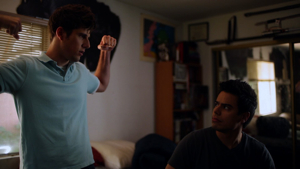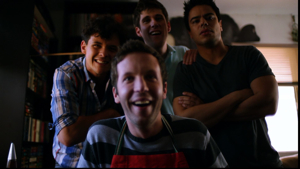As the token “comedude” at Comediva, it’s only fitting that I received the honor of producing the fantastic male-centric web series, Guy Time. Written by Comediva Founder Erika Cervantes, and directed by VP of Production Emily McGregor (two-thirds of the magic behind Comediva.com’s flagship show, The Divas), Guy Time is a female fantasy about what guys would do at a slumber party. Four guy friends have “guy’s night in” and reveal their innermost desires and fears in an emotional male bonding sesh.
A web series can’t be thrown together overnight (at least, not one that you’d want to watch). My man-slaving experiences have taught me a few things. Here’s a look at some of the steps involved in producing a web series.
Casting:
You can have the most awesome script ever, the fanciest camera, and the most elaborate make-up, and a flat performance will sink you. Especially in a web series, strong performances will carry the show. After our first, long day of auditions, the one bright, shining star we saw was Mercer Boffey (Days of Our Lives), who gave us a hysterical and very physical take on gym-rat Bobby. However, we just weren’t seeing enough actors who had the balance of comedic timing and acting ability that we needed. We’d seen more than enough monotone, dead-eyed model-looking types, thank you very much! There’s a temptation to go with the best of whoever shows up to your first audition, but never settle!
The second, more targeted round of auditions brought us comedic actor Ben Begley (Raising Hope, Franklin & Bash), Colin Contreary, who also gave us an incredible Bobby audition, and actor/stand-up comic Francisco E. Ramos (Rio, Marmaduke), whose awesome audition led to a rewrite of the script. The character of bad-boy lothario Damian was renamed Ramon, and the dialogue was changed to better suit the actor. This is an example of how choosing the very best performer can even shift the production creatively.
Locations:
When shooting a web series on a limited budget, a script with multiple locations is definitely the harder way to go. More time spent setting up and breaking down, location fees and other expenses make it far preferable to keep the action contained to one or two locations.
My advice is: use what you got.
Does your brother own a bar? Ask him to let you shoot in it after-hours. Your aunt’s overgrown backyard looks just like the jungle you need? Entice her with the honor of being involved in the filmmaking process (plus access to your craft services and lunch). If you have access to a location, try to make it work for your project. Maybe that gym scene can take place in a bookstore instead (which your cousin just happens to run). The entirety of Guy Time was shot at my parents’ house, with my childhood bedroom recorded for posterity as Frank’s room.
The Shoot:
All eight episodes of Guy Time were shot over three stressful and occasionally hectic days. When a carpet cleaner working at the house directly across the street fired up his ridiculously loud equipment just as we finished setting up an exterior shot, Emily headed over to ask for a momentary reprieve. Unfortunately, we had to deal with the loud buzzing for almost another hour. And no one could do much about the constant planes passing overhead, making every other take unusable. While noise issues will always happen, there is a lesson to be learned: if at all possible, avoid locations near airports. (And get an awesome sound person: thank you, Necromancer of Noise, Sean Oakley!)
While the environment didn’t always cooperate, the scenes being brought to life were gut-bustingly magical. Shooting in my parents’ home really encouraged the actors to hang out and bond, which definitely helped their on-screen chemistry. The actors and crew entertained themselves by analyzing the photo spreads in the prop Playboy magazines and read from my vast comic book collection. In between takes, my mom made everyone cups of Cuban coffee. On all the Comediva shoots that I’ve had the privilege of working on, there’s been a fun attitude on the set. While everyone is definitely working hard, it’s important to keep your cast and crew happy and motivated. A miserable set won’t usually produce the comedy gold that can be mined from such a great script and funny actors. Plus, a happy cast and crew will go above and beyond for you and for the project.
Post-Production:
So you’ve got all your footage and it’s looking good. What’s next? Finding the right editor is absolutely necessary. Sometimes, you’ll hear about the Writer-Director-DP-Editor who assures you that he’s got it all under control. Why pay for an editor, right? Wrong. While I’m sure there are many very competent multi-talented individuals out there, there’s also a big difference in hiring someone who has chosen editing as a career, not a hobby. Find the right editor for your type of project. Action? Look for someone who’s worked with similar material and knows how to cut together a fight scene. Comedy? An editor who understands comic timing is essential. Guy Time was fortunate to have editor extraordinaire Alex Oppenheimer, whose incredibly fast turn-around and excellent sense of comedy brought the footage to life.

A good composer can immediately make the production value of your project skyrocket. Most web content creators don’t bother with original music; however, it can make a big difference. For our score, we approached Christopher Thomas, a vastly talented composer. Not only did he deliver incredible music cues throughout the series, but the closing theme song he created has become one of my favorite pieces of music ever. “Guy time! Guy Time! Hunh!!!” I’m embarrassingly proud that the “Hunh!!!” comes just as my producer credit appears onscreen. (If you haven’t heard the music yet, go. Now. Trust me, it’ll make your day!)
The final episode of Guy Time premieres today. Watch them all!

